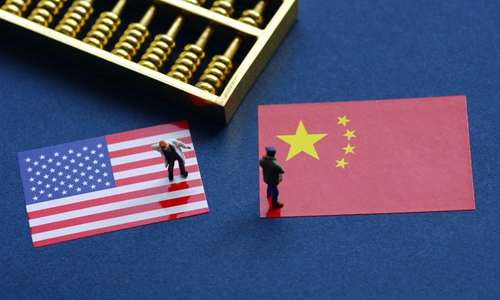HOME >> OPINION
Senators exploit doctor’s death to attack China’s political system
By Ai Jun Source:Global Times Published: 2020/2/13 22:33:34

Photo: VCG
The world's most crucial ties, China-US relations are now coming to a crossroads. The novel coronavirus outbreak has given us a clearer understanding of US strategic direction toward China. Although China is working hard to promote the relationship between the two countries toward healthy and stable development, the recent strategic moves of the US showed that a strong force in the US is pushing the ties toward a hostile path, which is obviously making the future of Sino-US relations more unstable.
Since last year, the US government and Congress have issued a number of policies and bills to accelerate the decoupling of the economies and high technologies of the two countries, showing a strong intention of strategic confrontation. Many strategic analysts have asserted that China-US relations will no longer return to a normal track. Recent moves by the US are exacerbating such concerns and adding risks to global politics, diplomacy, and economy.
On Tuesday, four Senators from the Republican and Democratic parties introduced a resolution honoring the life of Li Wenliang, one of the first Wuhan doctors to raise the alarm about the virus outbreak. These Senators do not really care about health of the Chinese people. Instead, they are making Li's death an opportunity to carry out a political attack on China, while challenging China's core interests, asking China to "cease efforts to exclude Taiwan from international organizations, including the World Health Organization and the International Civil Aviation Organization."
The epidemic could become a chance for the two countries to cooperate and enhance mutual trust, yet as China is all in to fight the virus, the death of Li is being exploited and politicalized by some US politicians. This once again shows that attacking China's political system has become part of the US' China strategy. It must realize that this is one of the main causes of turbulence in China-US relations.
More decoupling efforts can be observed in the past days. Reports show that the Pentagon is poised to back new US restrictions on Chinese tech giant Huawei. US officials have continued to smear China's governance in the Xinjiang Uygur Autonomous Region, warning of the so-called Chinese infiltration into the US. And the White House released its new National Counterintelligence Strategy, calling for a "whole-of-society approach" to combat the so-called threats from Russia and China.
China is fully aware that Beijing and Washington need to find a path of peaceful coexistence between different political systems and ideologies to make a contribution to world peace. A healthy relationship between China and the US will benefit both sides and the world. However, some people in the US do not seem to think so. They try to make China an adversary to stimulate themselves, to maintain its global dominance. But as a result, they have pushed the relationship between the two countries toward the path of hostility, endangering the already fragile mutual trust between the two sides.
The pandemic provides China a clear view that some people in Washington will never easily change their paranoid belief that Beijing poses a threat to the US and they are using every possible opportunity to curb China's development.
China does not want to be a US rival, but if the US continues following this strategy, it is making itself an enemy. As Chinese Ambassador to the US Cui Tiankai pointed out, "We should guard against any 'political virus' that prevents China and the US from joining hands to counter our common challenges."
Posted in: OBSERVER